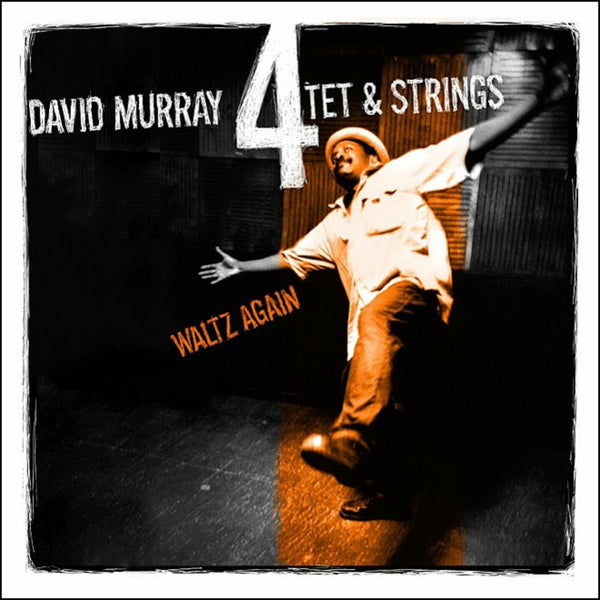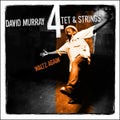
Release Date:
Downloads include choice of MP3, WAV, or FLAC
Waltz Again begins with a thick squall of strings and hyper-Ayler sax wailings, laying down a warning. The strings in this recording will not sit still as a plush backing for treacly balladeering, but will instead bob and weave in constant interplay with the quartet. And when the true ballads come, their beauty gleams off the frenzy that passed before and will rage after.
After the squall there is mourning, a swirling dirge of violins that would have Bernard Herrmann sneak a nod of approval. Obsessive and insistent, one envisions a paranoid protagonist bemoaning those voices in his head. That voice, I suppose, would be of Pushkin, and of the works that Murray namechecks for each movement of his "Pushkin Suite #1."
That bracing opening is entitled "Blackamoor of Peter the Great," after Pushkin's unfinished romance about his African great-grandfather, Ibrahim Petrovich Gannibal. A slave who rose to become a prominent member of Empress Elizabeth's court, the story fictionalizes the youth's assimilation to Russian society—and those seesawing strings and oft-times lyrical clarinet and sax stabs offer a rich portrait of angsty yearning. But comparisons should cease there, as Murray takes the music to levels no narrative could track—the bliss of the sax phrases briefly jiving with the string melodies before breaking it all down again, words can't describe. Then again... a poem by Pushkin equals Murray’s Ben Webstering a quivering heart on the floor love ballad. The Russian declaims:
I loved you, and I probably still do,
And for a while the feeling may remain...
But let my love no longer trouble you,
I do not wish to cause you any pain.
I loved you; and the hopelessness I knew,
The jealousy, the shyness—though in vain—
Made up a love so tender and so true
As may God grant you to be loved again.
That man knew the blues. He would've loved Murray.
Onward. With “Waltz Again” his sax swings on the string swell and manages some intimate asides before they ramp up again, bombastic and affecting, a similar if less adventurous feat achieved earlier this year by Wynton Marsalis in his strings concert. “Dark Secrets” continues the richness, with some syncopated rhythm and foot tappin’, the strings reaching for the stars in insistent riffs that Murray outdoes with a high-register, laid back insouciance.
“Steps” slows it down, way on down, down in those areas that cut off major motor functions. Light some candles. Highlight: on a break he wails and sighs, poutingly imploring his lover to sidle up and make some real noise. All he gets are strings and a bass ostinato. Sublime. “Sparkle” is merely capable, the strings sawing a simple theme and Murray jabbing his way around it, eventually settling down into a relaxed, ridiculously swinging lounge act. But a lounge act it remains. No matter. David Murray has made one of the albums of the year.
- R. Emmet Sweeney
Waltz Again
David Murray
Downloads include choice of MP3, WAV, or FLAC
Waltz Again begins with a thick squall of strings and hyper-Ayler sax wailings, laying down a warning. The strings in this recording will not sit still as a plush backing for treacly balladeering, but will instead bob and weave in constant interplay with the quartet. And when the true ballads come, their beauty gleams off the frenzy that passed before and will rage after.
After the squall there is mourning, a swirling dirge of violins that would have Bernard Herrmann sneak a nod of approval. Obsessive and insistent, one envisions a paranoid protagonist bemoaning those voices in his head. That voice, I suppose, would be of Pushkin, and of the works that Murray namechecks for each movement of his "Pushkin Suite #1."
That bracing opening is entitled "Blackamoor of Peter the Great," after Pushkin's unfinished romance about his African great-grandfather, Ibrahim Petrovich Gannibal. A slave who rose to become a prominent member of Empress Elizabeth's court, the story fictionalizes the youth's assimilation to Russian society—and those seesawing strings and oft-times lyrical clarinet and sax stabs offer a rich portrait of angsty yearning. But comparisons should cease there, as Murray takes the music to levels no narrative could track—the bliss of the sax phrases briefly jiving with the string melodies before breaking it all down again, words can't describe. Then again... a poem by Pushkin equals Murray’s Ben Webstering a quivering heart on the floor love ballad. The Russian declaims:
I loved you, and I probably still do,
And for a while the feeling may remain...
But let my love no longer trouble you,
I do not wish to cause you any pain.
I loved you; and the hopelessness I knew,
The jealousy, the shyness—though in vain—
Made up a love so tender and so true
As may God grant you to be loved again.
That man knew the blues. He would've loved Murray.
Onward. With “Waltz Again” his sax swings on the string swell and manages some intimate asides before they ramp up again, bombastic and affecting, a similar if less adventurous feat achieved earlier this year by Wynton Marsalis in his strings concert. “Dark Secrets” continues the richness, with some syncopated rhythm and foot tappin’, the strings reaching for the stars in insistent riffs that Murray outdoes with a high-register, laid back insouciance.
“Steps” slows it down, way on down, down in those areas that cut off major motor functions. Light some candles. Highlight: on a break he wails and sighs, poutingly imploring his lover to sidle up and make some real noise. All he gets are strings and a bass ostinato. Sublime. “Sparkle” is merely capable, the strings sawing a simple theme and Murray jabbing his way around it, eventually settling down into a relaxed, ridiculously swinging lounge act. But a lounge act it remains. No matter. David Murray has made one of the albums of the year.
- R. Emmet Sweeney


